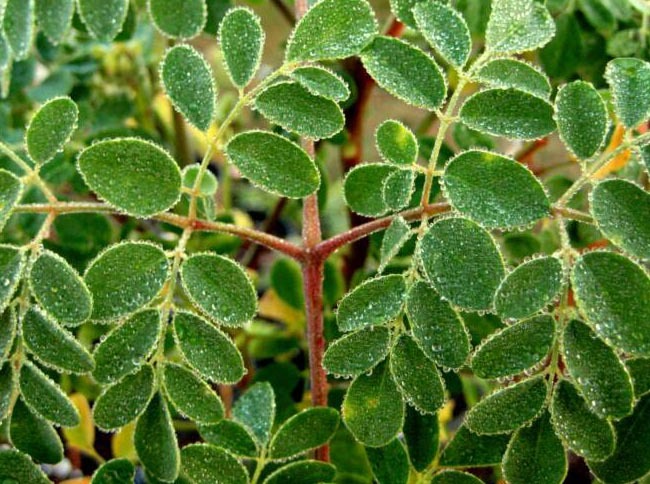Moringa Tree and Cancer: Side Effects and Research Studies

Many people with cancer inquire about herbal medicine as a complementary therapy after reading anecdotal reports of herbal cancer cures online.
One such herb, known as moringa tree, is reported to prevent and cure cancer.
Research has investigated moringa as a treatment for cancer, asthma, cardiovascular disease, diabetes and other diseases.
Moringa is a plant native to India, but it is grown worldwide in tropical and subtropical regions.
There are 13 species of moringa that range in size — from leafy shrubs to tall trees. The most commonly harvested species, M. oleifera, is a small, fast-growing tree.
Cancer research on moringa has been conducted in test tubes and in mice, but not in humans. The studies involving test tubes and mice show moringa can kill several different types of cancer cells, but this hasn’t been confirmed in human clinical trials.
There are no studies about the effect of moringa on mesothelioma.
What Are the Side Effects of Moringa?
While the leaves are perfectly safe, consuming large quantities of the bark or pulp may be harmful.
Moringa side effects may include:
- Lower blood pressure and slow heart rate because of the alkaloids in the plant
- Uterine contractions from moringa bark
- Cell mutations caused by a chemical isolated from roasted moringa seeds
- Interference with fertility
- Upset stomach, gas or diarrhea due to laxative properties
Moringa leaves also increased the risk of liver and kidney damage in rats. Do not consume moringa if you are pregnant, taking the diabetes drug Januvia (sitagliptin) or taking drugs that are substrates of the cytochrome P450 family of enzymes.
Cancer Research on Moringa
All cancer research involving moringa has been conducted on mice or on cancer cells grown in labs, but not in humans.
This means the available information on moringa and cancer is theoretical and hasn’t been proven or disproven in human clinical trials.
Cancer research on moringa tree has involved cancer prevention and treatment:
- A 2006 study published in the Journal of Experimental Therapeutics and Oncology reported that a molecule found in moringa killed ovarian cancer cells cultivated in a lab.
- A 2013 study published in BMC Complementary and Alternative Medicine examined the effects of moringa leaf extract on lung cancer cells cultivated in a lab. Researchers found the extract caused oxidative stress and DNA damage that killed the lung cancer cells.
- A 2014 study published in PLoS One also looked at the effects of moringa leaf extract on lung cancer cells cultivated in a lab. This study found moringa limited tumor growth and caused lung cancer cells to die.
- A 2015 review published in International Journal of Molecular Sciences reported on several studies that found moringa had anti-cancer effects on lab-cultivated cancer cells including pancreatic cancer cells, liver cancer cells, colon cancer cells and leukemia cells.
- A 2017 study published in the Asian Pacific Journal of Cancer Prevention found an extract from moringa leaves tested on several cancers in a lab reduced cancer cell growth and promoted cell death.
In this free recording, learn how this latest FDA-approved combination therapy offers new hope to patients.
Get a RecordingNutritional Values of Moringa
The 2018 National Nutrient Database for Standard Reference shows 1 cup of chopped moringa tree leaves contains:
- 2 grams of protein
- 11% of the Recommended Dietary Allowance (RDA) of iron
- 9% of the RDA of vitamin A
- 12% of the RDA of vitamin C
The levels of vitamins C and A, which are antioxidants, help protect against cell damage caused by chemicals in the body, known as free radicals, which can play a role in the development of cancer.
Vitamin C helps the body maintain a healthy immune system, while vitamin A can help maintain mucous membranes that protect against infections in the respiratory and digestive tracts.
Moringa leaves also contain amino acids that may boost the immune system. This may help patients undergoing treatments such as chemotherapy, but no research has been conducted in this area yet.
The National Institute of Nutrition’s 1989 book, “Nutritive Value of Indian Foods,” shows a handful of moringa leaves contains:
- Seven times the amount of vitamin C in an orange
- Three times the amount of iron in spinach
- Four times the amount of vitamin A in a carrot
- Four times the amount of calcium in one glass of milk
- Three times the potassium in one banana
- Two times the protein found in regular, plain yogurt
Moringa leaves can be eaten fresh, cooked or crushed, and they can be stored as dried powder for several months without loss of nutritional value.
Moringa leaves can be blended into fruit smoothies or used as a replacement for spinach in most recipes. Dried moringa powder may be added to a curry recipe and served over rice.
Moringa and Herbal Medicine
According to ethnobotanical records, moringa has been used by herbalists to help with a variety of symptoms, including common mesothelioma symptoms such as difficulty breathing, cough and other respiratory complications.
Additional scientific research and clinical studies are needed to understand the potential of moringa to prevent and treat cancer.
Keep in mind that cancer treatments affect people differently. As with any complementary treatment, it is best to talk with your doctor before adding moringa to your treatment regimen or diet.
If you experience any side effects, you should seek medical attention immediately.